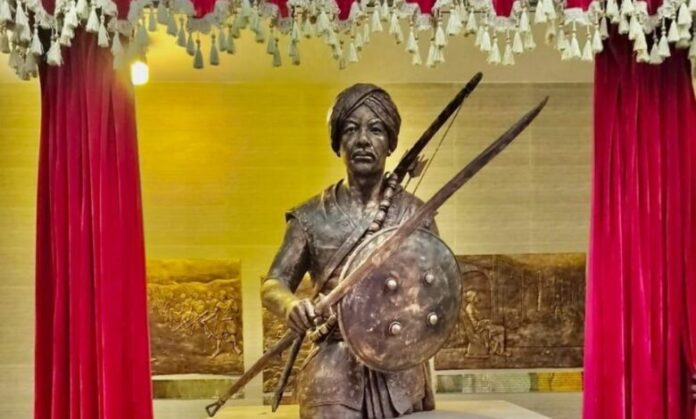Meghalaya Chief Minister Conrad K. Sangma has strongly condemned the vandalism of U Tirot Sing Syiem’s statue at the Indian Cultural Centre in Dhaka, Bangladesh. The statue, which was unveiled only six months ago, suffered desecration during recent civil unrest in the neighboring country.
In a statement issued on August 6, Sangma expressed deep concern over the attack on the statue of U Tirot Sing Syiem, a revered leader of the Khasi people. The statue, a symbol of pride for the Khasi community, had stood as a tribute to the warrior’s legacy and his contributions to the region’s history.
Reports indicate that the statue was damaged significantly amidst the turmoil that has plagued parts of Bangladesh in recent weeks. The vandalism occurred against a backdrop of escalating tensions and civil unrest, which has seen widespread protests and clashes. The statue, located in the Indian Cultural Centre’s premises, had been a focal point for cultural and historical appreciation between India and Bangladesh.
Chief Minister Sangma’s condemnation underscores the sensitivity and importance of preserving cultural and historical symbols. “The act of vandalism is deeply disturbing and disrespectful,” Sangma said. “U Tirot Sing Syiem is an important figure in our history, and such acts of desecration undermine the efforts to foster goodwill and understanding between our nations.”
Sangma also urged the Bangladesh authorities to take swift action to investigate the incident and bring those responsible to justice. The vandalism has sparked outrage among the Khasi community and other supporters who view U Tirot Sing Syiem as a national hero. The Chief Minister’s call for justice reflects a broader concern for the protection of cultural heritage.
In response to the incident, the Indian High Commission in Dhaka has expressed its dismay and sought assurances from the Bangladeshi government. The High Commission has also demanded a thorough investigation into the vandalism and called for enhanced security measures to protect Indian cultural properties in Bangladesh.
The vandalism of the statue highlights ongoing challenges in maintaining cultural and diplomatic relations amidst regional tensions. While the incident has brought to light the fragility of cultural symbols in times of unrest, it has also reinforced the need for continued dialogue and cooperation between India and Bangladesh.
Supporters of U Tirot Sing Syiem have rallied in various parts of Meghalaya to express their discontent and demand reparations. They have organized demonstrations and social media campaigns to raise awareness about the attack and to call for the restoration of the damaged statue.
The incident also sheds light on the broader issue of protecting cultural artifacts in volatile regions. It serves as a reminder of the importance of safeguarding symbols of shared history and heritage, especially in areas prone to political and social unrest.
As investigations continue, the focus remains on ensuring that justice is served and that measures are put in place to prevent similar incidents in the future. The vandalism of U Tirot Sing Syiem’s statue serves as a poignant reminder of the impact that political and social unrest can have on cultural symbols and the need for ongoing vigilance and protection.
The statue’s desecration has deeply affected the Khasi community, which sees U Tirot Sing Syiem as a symbol of resilience and pride. The Chief Minister’s condemnation and the ensuing call for action reflect a commitment to preserving cultural integrity and fostering positive relations between nations.




